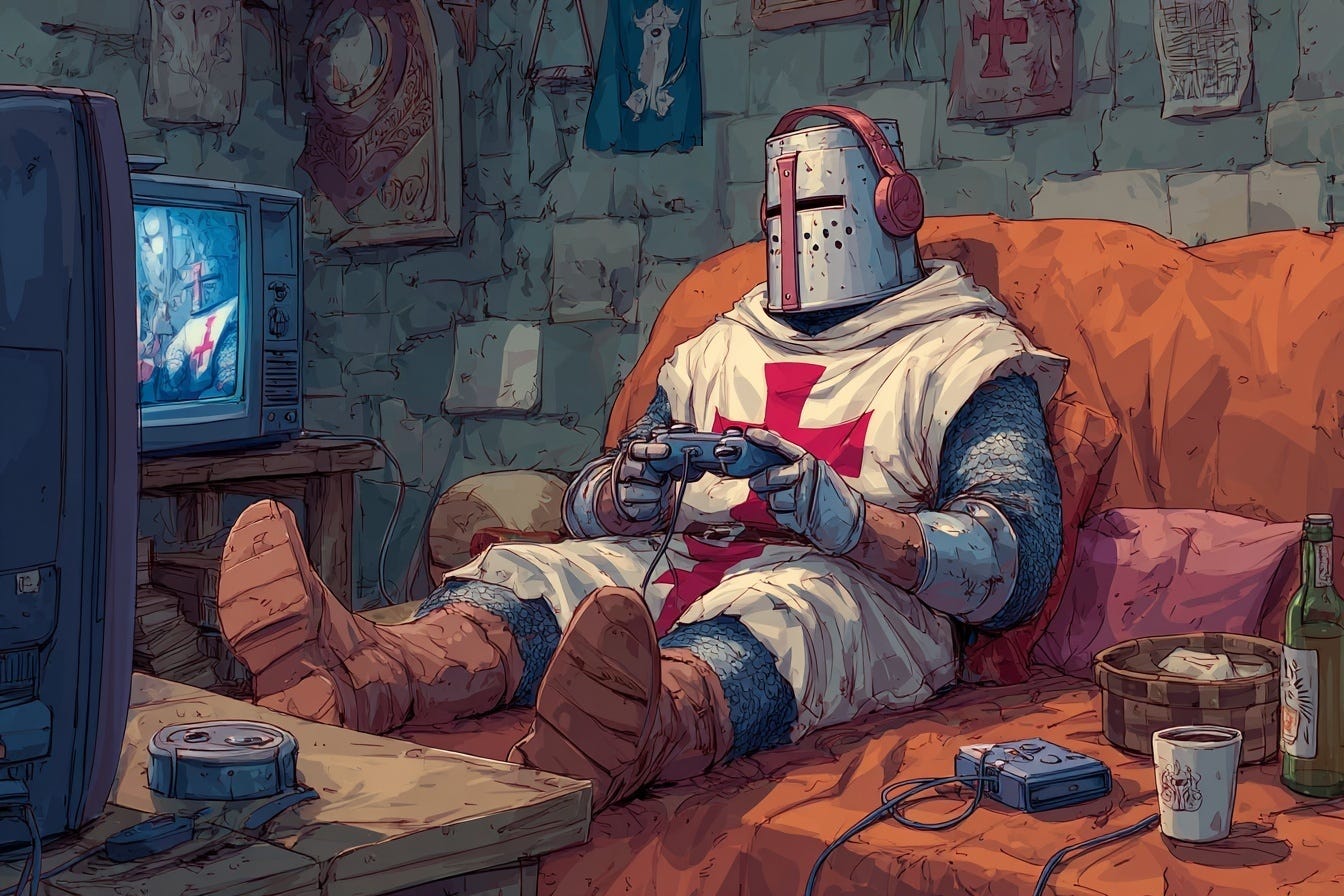Steam, the world’s largest PC game platform, has recently removed over 400 games from its storefront. Many of these titles were pornographic, exploitative, or constituted what critics call "asset flips" or low-effort cash grabs with little artistic value.
The purge follows pressure from activist groups like Collective Shout, payment processors wary of legal risk, and public backlash against increasingly explicit or disturbing content on digital platforms.
For some, this was a moral victory. For others, it was an Orwellian nightmare. And for many Christians caught in the crossfire, the question remains: What side should we take?
This is the kind of cultural dilemma that demands not just a hot take, but a theological framework. In this case, we can benefit from the approach of theologian John M. Frame, whose "triperspectival" method evaluates ethical questions from three angles: the normative (God's commands), the situational (facts on the ground), and the existential (the heart of the person acting).
Let us consider the Steam purge through these three lenses.
1. Normative Perspective: God's Moral Law
Scripture speaks clearly about the corrupting nature of sexual sin and the call to holiness. Pornography, in any form, degrades human dignity, sears the conscience and twists sexuality into something transactional and exploitative (1 Cor. 6:18; Matt. 5:28). From this perspective, Steam's removal of sexually explicit or abusive content can be seen as an act that aligns, at least partially, with God's moral standards.
But Frame also reminds us that all law has a source. If the standard for censorship comes from activist ideologies or even financial liability, then these are operating on borrowed capital. These norms, detached from the Lordship of Christ, are ultimately unstable. Today's moral consensus can become tomorrow's tyranny. Christians must always ask: Whose morality is being enforced, and by what authority?
2. Situational Perspective: What's Really Going On?
From a situational perspective, this wasn't a clean moral crusade. Activist pressure came largely from secular sources like Collective Shout which, while opposing sexual exploitation, often ground their arguments in secular feminism rather than divine revelation. Payment processors, wary of legal exposure, flexed their financial power to force Steam's hand. In other words, the purge was as much about PR and liability as it was about morality.
What we see, then, is a complex interplay of motivations. Some are just, some are opportunistic, and many are ideologically confused. What this results in is ethical action that takes place within messy and fallen contexts. For this reason, I can be happy about a purge of sexual degeneracy while also remaining cautious in applauding a victory whose foundations may prove to be sand.
Furthermore, we must consider whether this entire episode is a form of divine judgment. Scripture testifies that when people persist in rebellion, God "gives them up" to their desires (Rom. 1:24-28). A society obsessed with entertainment, indulgence and sexual license may find that even its cultural correction comes not from repentance but from bondage. This is not moral reform but reaping the whirlwind. The same systems that celebrate autonomy today may become instruments of control tomorrow. In such a context, the purge may not be deliverance but discipline, a culture being handed over to its idols, until the idols devour their worshipers.
3. Existential Perspective: The Heart in Conflict
Libertarian critics of the purge often cry foul in the name of "freedom of expression." But freedom, as Scripture defines it, is not the license to sin but the ability to serve Christ in holiness (Gal. 5:13). A society that elevates choice above righteousness is not free; it is enslaved.
That said, Christians should not find refuge in a solution that imposes order without the grace. Censorship, while practical, does not transform the heart. A sanitized platform is not the same as a sanctified people. What this means is that, beyond deciding what games are removed, we must also take into account what virtues are cultivated in their place.
Frame's pastoral insight would push us to ask deeper questions: What kind of desires are we feeding? What kind of creators are we forming? What kind of stories are we telling?
READ: 'Subnautica' Developers File Lawsuit Against Krafton After They Were Fired
Conclusion: The Third Way
In a polarized age, Christians may be pressured to choose between libertarian autonomy and secular moralism. But both options are inadequate. The former deifies freedom, the latter weaponizes virtue without grounding it in truth.
In the words of Norm Macdonald, "I believe everyone involved in this story should die."
The Christian response is not neutrality but allegiance to Jesus Christ, who is Lord of culture, art, commerce, and conscience. We rejoice when evil is restrained, but we do not mistake cultural scolding for spiritual renewal. We must also remember that God is able to bring good even out of human sin and folly. Even when a fallen humanity pursues sinful ends or imposes flawed justice, God can work through these events to accomplish His redemptive purposes.
Steam's purge may be a step in the right direction, but only if it leads us toward a culture that doesn't just censor evil but loves the good.
Freedom without Christ is bondage (John 8:36).
Morality without God is hypocrisy (Romans 7:7–25).
Without a new heart and spirit, external reform is empty (Ezekiel 36:26–27).
NEXT: Exclusive Interview: 'The Great Rebellion' Developer Reveals New Details About Next Game








Thank you for this 3-pov analysis. While I feel glad that pornography is slightly less profitable today than it was before, the hearts of the creators and consumers of these games have not changed. So, there is no victory here, IMO. The people involved are still who they were before. However, I am glad people are at least talking about it now.
There’s quite a few problems at play here when it comes to censorship of content. But I will try to contain them to the major ones.
1. Coming to a consensus of what is considered pornography. Even amongst political ideologues and of those from the Christian faith, they have conflicting opinions, views and personal biases when it comes to the subject. It can get incredibly heated and hard to get to the heart of the matter of what is considered pornography versus art.
Might I remind Christians that the Bible contains stories like the Song of Solomon, which is a clear example of love, attraction, sensuality and sexuality. Along with other stories involving gangrape, incest, more rape, and the like.
And for progressives we have a bevy of smut, degeneracy and “sexual expression/awakening” from feminists and gay activists that are considered “safe horny”. Of which includes, bestiality, prostitution, rape, sex with minors, abusive relationships and having unending amounts of partners.
Until we have everyone on the same page know where the line of artistic expression is and cheap pornographic exploitation is. It’s really hard to move forward. Because at this point even amongst conservatives, progressives, libertarians and Christians you will have entirely different lines in the sand.
2. We need to enforce the rules properly on these platforms.
Unfortunately, the rules of what is and isn’t tasteful, what can be changed and allowed on any platform whether it is Steam, PSN, XBL or Nintendo eshop is is completely out there and decided day by day with standards that fluctuate wildly. Even Steam which people have praised significantly has had games changed post-release like Skullgirls and Ready or Not that are completely unwarranted and games that have to be censored or banned entirely over the years.
This is definitely exacerbated by the fact that most of the people in tech are highly progressive so they tend to fall in line but censorship wouldn’t be such an issue if everyone was playing honest and fair with morals and rules.
Clearly established rules for publishing, proper age ratings and a clear understanding of what is allowed in any given company should be tantamount to this industry to give some cohesion to what you can do in your medium.